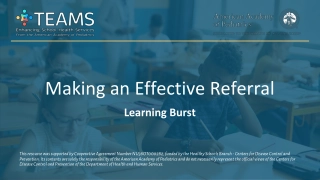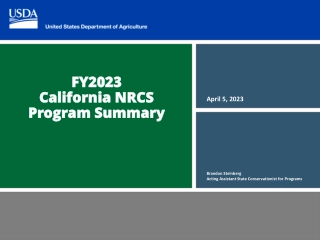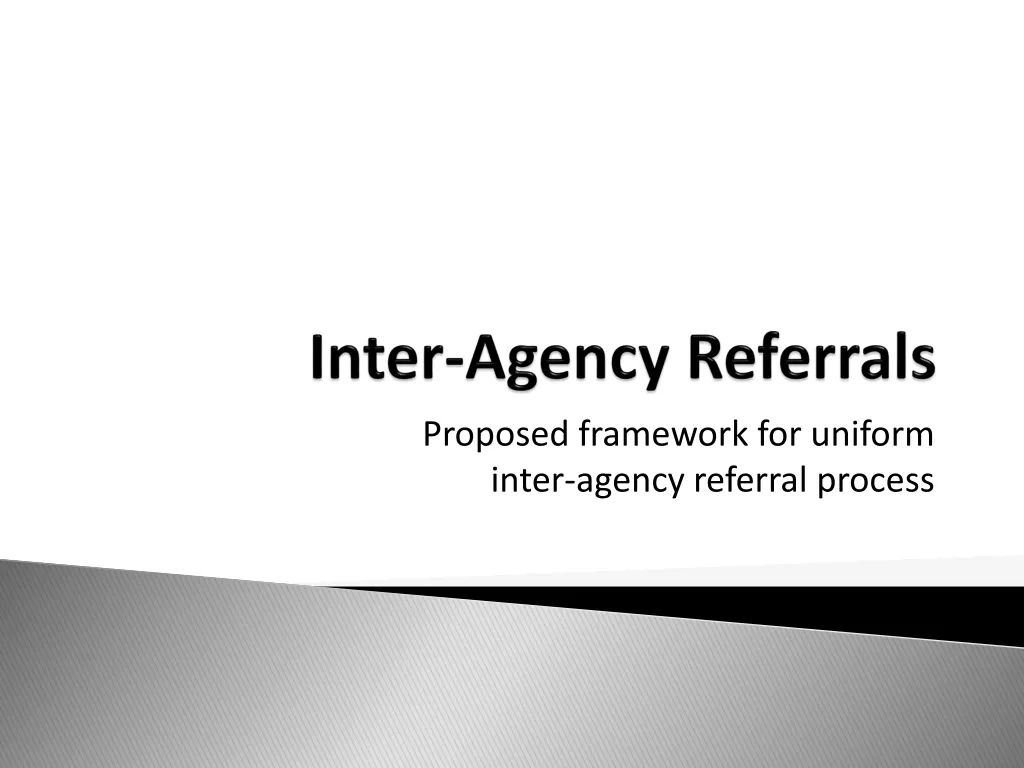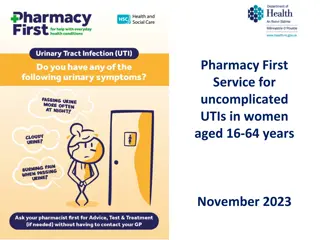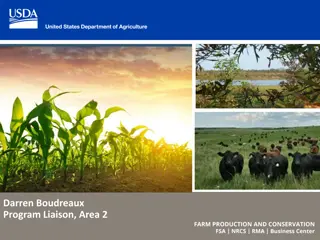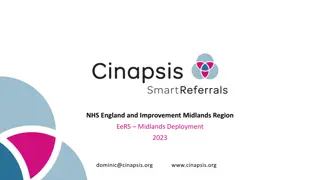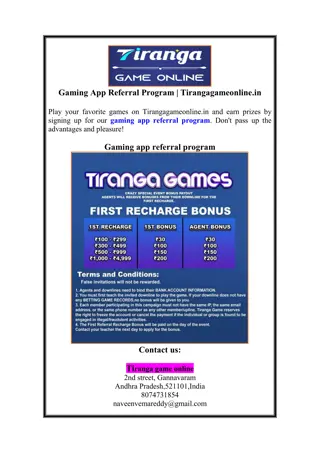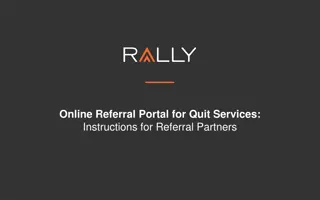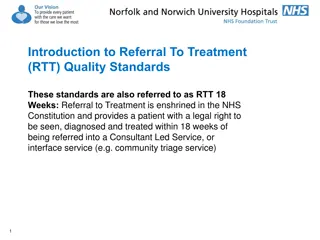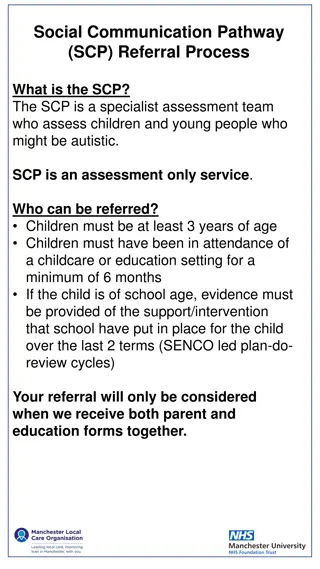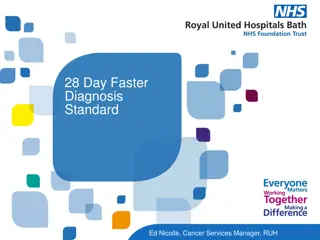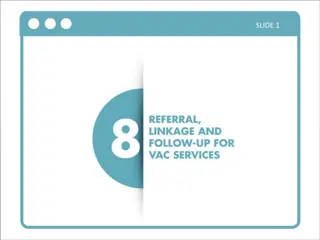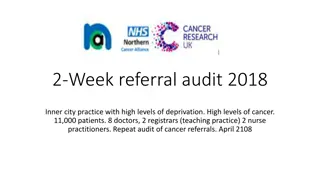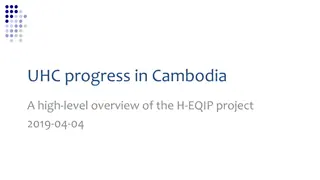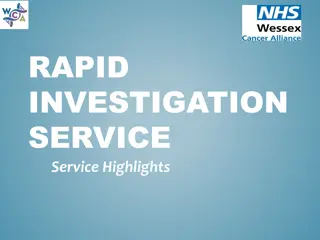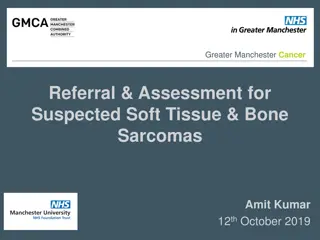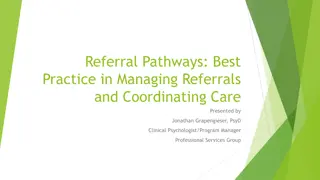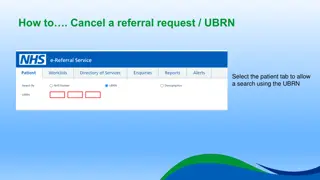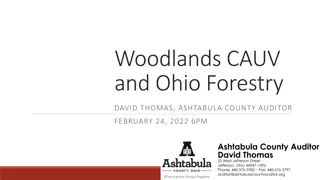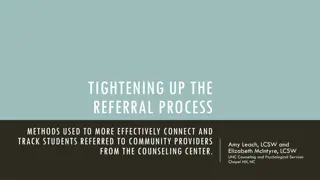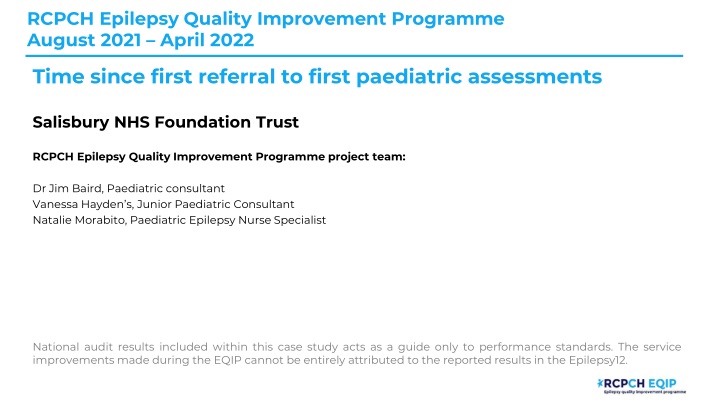
Improving First Seizure Pathway at Salisbury NHS Foundation Trust
"Learn about Salisbury NHS Foundation Trust's efforts to enhance their first seizure pathway, aiming to ensure timely assessments for patients with suspected seizures. Discover the strategies implemented to reduce waiting times and improve patient care through innovative changes and new protocols."
Download Presentation

Please find below an Image/Link to download the presentation.
The content on the website is provided AS IS for your information and personal use only. It may not be sold, licensed, or shared on other websites without obtaining consent from the author. If you encounter any issues during the download, it is possible that the publisher has removed the file from their server.
You are allowed to download the files provided on this website for personal or commercial use, subject to the condition that they are used lawfully. All files are the property of their respective owners.
The content on the website is provided AS IS for your information and personal use only. It may not be sold, licensed, or shared on other websites without obtaining consent from the author.
E N D
Presentation Transcript
RCPCH Epilepsy Quality Improvement Programme August 2021 April 2022 Time since first referral to first paediatric assessments Salisbury NHS Foundation Trust RCPCH Epilepsy Quality Improvement Programme project team: Dr Jim Baird, Paediatric consultant Vanessa Hayden s, Junior Paediatric Consultant Natalie Morabito, Paediatric Epilepsy Nurse Specialist National audit results included within this case study acts as a guide only to performance standards. The service improvements made during the EQIP cannot be entirely attributed to the reported results in the Epilepsy12.
Time since first referral to first paediatric assessments Salisbury NHS Foundation Trust Project aim Improve first seizure pathway with key aim to ensure 75% or more of first seizure patients are seen within 2-4 weeks. Background Salisbury NHS Foundation Trust is a DGH with a 16-bed inpatient unit and a paediatric epilepsy service team for 160 patients one paediatrician with epilepsy interest, ESN, and admin support. The team actively takes part in Epilepsy12 data submission, with data returns that are well above the regional and national average. Previous audit results for patients with a first seizure seen by a paediatrician with an interest in epilepsy within 2 weeks revealed some patients were waiting over 16 weeks to be seen in clinic. Epilepsy12 data: Quality statement 1: Are patients with suspected seizures seen within 2 weeks? 2019: 50% seen in 2-6 weeks, 25% in >16 weeks; 2020: 30% in <4 weeks, 40% in 6-12 weeks, 25% in >14 weeks. Area of focus The team plans to map the patient journey to uncover the barriers and help reduce waiting time by developing/changing their referral process and improving their first seizure advice and information for patients and their families.
Time since first referral to first paediatric assessments Salisbury NHS Foundation Trust Driver diagram
Time since first referral to first paediatric assessments Salisbury NHS Foundation Trust Changes Created clinic space; added extra patient(s) as needed to clinics. Altered GP referral review and case triage; electronic referral system done by two consultants; pathway altered for new seizure referrals by easy access to contact ESN. Designed and hung posters providing information on the new pathway and information for the paediatric and ED teams to email referrals to the admin/ESN team. Produced a flow chart that maps out the pathway of what should happen when a patient is admitted with a first seizure and displays it for DSU staff to refer to first. Reviewed the data collected on the time taken from the referral for the team to see them in clinic and developed a new first seizure pathway using this baseline data. Continued to develop and standardise improved information shared with parents and patients.
Time since first referral to first paediatric assessments Salisbury NHS Foundation Trust Mapping improvement pathway
Time since first referral to first paediatric assessments Salisbury NHS Foundation Trust Results Simple baseline data collected by ESN Monthly data review by the team October March: 33 new patients seen in clinic All were seen within 7 weeks Approximately 80% seen within 4 weeks Created discharge pack for first seizure patients; contents include: Electronic discharge summary o What happens next? o Seizure recording chart o RCPCH first seizure leaflet o Fits, Faints and Funny Turns leaflet (Wessex Healthier Together) o Open access o Other resources o
Audit results cohort 3/4 professional input Salisbury NHS Foundation Trust NICE recommends that children and young people presenting with suspected seizure are seen by a specialist in the diagnosis and management of epilepsies within 2 weeks of presentation (Quality statement 1). The percentage of CYP with input from a paediatrician with expertise in the first year of care was 100% in 2021 above regional and national average. In 2022, this figure was 86%. Additionally, the percentage of CYP with input from an epilepsy specialist nurse in their first year of care has decreased to 50% in 2021 then increased to 91% in 2022, above national and regional averages. 2019 2020 2021 2022 Percentage of CYP with input from: 2021 WPNN 2021 England & Wales 2022 WPNN 2022 England & Wales 100% 100% 100% 86% 94% 88% 90% 91% Paediatrician with expertise OR paediatric neurologist (PI.1) 100% 100% 100% 95% 93% 85% 94% 89% Paediatrician with expertise Paediatric neurologist 50% 24% 0% 23% 20% 25% 33% 20% Epilepsy specialist nurse 100% 94% 50% 91% 61% 80% 83% 80%
Audit results cohort 3/4 time since first referral Salisbury NHS Foundation Trust The Salisbury paediatric epilepsy service are able to provide some level of input from a paediatric consultant with expertise in epilepsy. The percentage of CYP who were seen by a paediatrician with expertise in epilepsy within 2 weeks of first referral increased to 36% in 0-2 weeks and 14% in 2-4 weeks of first referral in 2022, above regional and national averages. 2019 2020 2021 2022 Time since first referral to first paediatric assessment 2021 WPNN 2021 England & Wales 2022 WPNN 2022 England & Wales 0-2 weeks 0% 24% 0% 36% 31% 23% 23% 21% 2-4 weeks 25% 6% 0% 14% 14% 12% 8% 11% 4-6 weeks 25% 0% 0% 9% 4% 9% 10% 11% 6-8 weeks 0% 29% 0% 14% 6% 7% 10% 8% 8-10 weeks 0% 6% 50% 5% 10% 5% 6% 7% 10-12 weeks 0% 6% 0% 0% 0% 3% 2% 5% 12-14 weeks 0% 0% 0% 0% 4% 3% 2% 3% 14-16 weeks 0% 6% 50% 0% 6% 2% 2% 2% 16+ weeks 25% 18% 0% 18% 14% 13% 29% 13%
Audit results cohort 3/4 time since first referral Salisbury NHS Foundation Trust Time since referral to first paediatric assessment in 2022 Graph showing Trust- level, regional and 60% national results on 50% time since referral to first paediatric 40% assessment in 2022. 30% RNZ represents 20% Salisbury NHS Foundation Trust . 10% 0% RNZ WPNN England & Wales 0-4 weeks 4-8 weeks 8-12 weeks 12-16 weeks >16 weeks
Time since first referral to first paediatric assessments Salisbury NHS Foundation Trust Challenges The team previously found patient engagement challenging, but participating in the EQIP provided training and guidance on the simplicity of the approach to patients and families. There has been no funded uplift in service yet. The team identified the need to improve clinic efficiency. The team struggled at times with progressing the project due to staff absences. Challenges to finding team time to plan activities and engage in EQIP events. The team reflected and acknowledged that patient engagement could have been done better.
Time since first referral to first paediatric assessments Salisbury NHS Foundation Trust Outcomes Monitored the improvements against Epilepsy12 audit results and already achieved a reduction in waiting times from 16 weeks to less than 6 weeks. Improvements have been made in waiting times in outpatient clinics over a period of 4 weeks by increasing access to patient slots for around three 3 patients per week. Between October and March, the team added 33 new patients, and 80% were able to see them within 4 weeks. 100% of new patients were seen within 7 weeks. Improved first seizure and initial referral review times. Continued to see 1 extra patient (or 2) per clinic. The epilepsy team will take on the booking process for all patients. In the future, we will test other engagement methods because the questionnaire method is not the best tool for patient feedback. Improved (standardised) information pack for patients and families and will continue to develop our patient engagement using simple approaches and activities.
Time since first referral to first paediatric assessments Salisbury NHS Foundation Trust National audit results The percentage of CYP with input from a paediatrician with expertise in the first year of care was 100% in 2021, above regional and national averages; in 2022, this figure was 86%. Additionally, the percentage of CYP with input from an epilepsy specialist nurse in their first year of care decreased to 50% in 2021 then increased to 91% in 2022, above national and regional averages. In 2022, the percentage of CYP who were seen by a paediatrician with expertise in epilepsy within 2 weeks of first referral increased to 36% in 0-2 weeks and 14% in 2-4 weeks in 2022, above regional and national averages.
Time since first referral to first paediatric assessments Salisbury NHS Foundation Trust Lessons learnt We can make simple improvements as a team. Start small and try something new. The team worked well together as a small team. Improved team understanding of QI methodology. Patient engagement can be simple, and we can do this more and even better. Just do it! Visual presentation of team project intervention Team video presentation
https://eqip.rcpch.ac.uk eqip@rcpch.ac.uk @RCPCHEQIP

